The first time I saw the word “Adonai” was in a worship song during a Sunday service. The melody was peaceful, but I had no idea what that word meant.
Later, I noticed it again on social media posts, tattoos, and even Bible study threads. That’s when curiosity struck — what does Adonai really mean?
Quick Answer:
Adonai means “my Lord” or “Lord” in Hebrew. It’s a sacred title used to refer to God, expressing deep respect, reverence, and devotion.
Unlike slang you see online, Adonai is not modern internet lingo — it’s an ancient and holy word that holds powerful meaning in both Judaism and Christianity.
🧠 What Does Adonai Mean in Text?
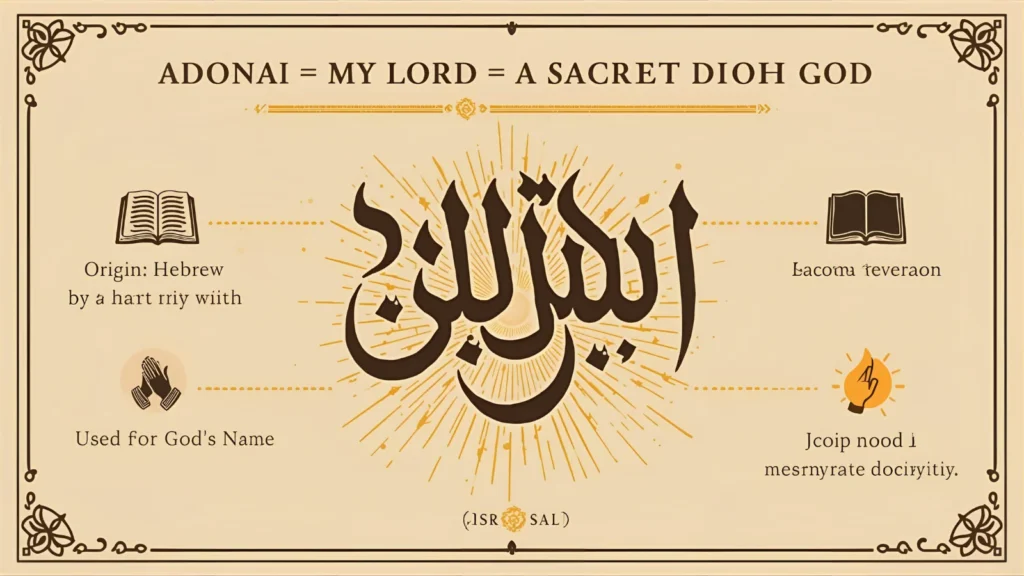
The term Adonai (Hebrew: אדֹנָי) translates to “my Lord.” It comes from the root word Adon, which means lord or master.
In Jewish tradition, this name is spoken aloud as a respectful substitute for YHWH (Yahweh) — the divine name considered too sacred to pronounce.
People often use Adonai in prayers, hymns, and scripture readings to express honor and submission to God. For example:
“Blessed are You, Adonai our God, King of the universe…”
It’s not a casual word — it carries deep spiritual weight and shows reverence.
In short: Adonai = My Lord = A sacred title used for God.
🗣️ How to Pronounce Adonai
Many people wonder how to say this word correctly.
Adonai is pronounced as ah-doe-nai (ah-doe-NYE).
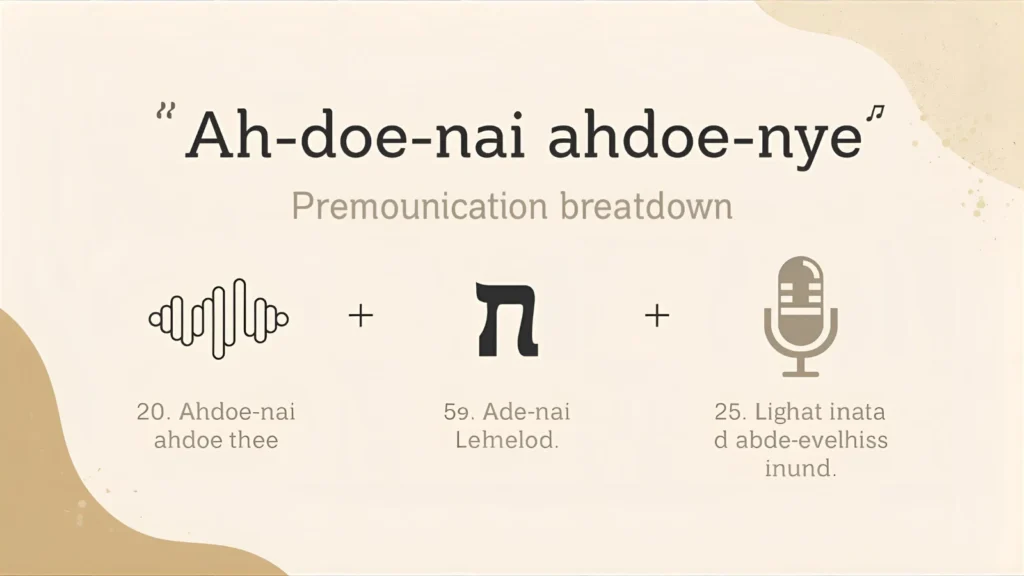
In Hebrew script, it appears as אדֹנָי.
When spoken, each syllable is clear and flowing — reflecting the reverent tone it deserves. It’s often chanted slowly in prayers or songs, especially in Hebrew worship.
Quick takeaway: Say it softly and respectfully — it’s a word meant for worship, not casual conversation.
📜 Origin and Etymology of Adonai
The word Adonai dates back to ancient Hebrew texts in the Old Testament. The root Adon was used to mean lord or master — a title for kings, leaders, or even respected elders.
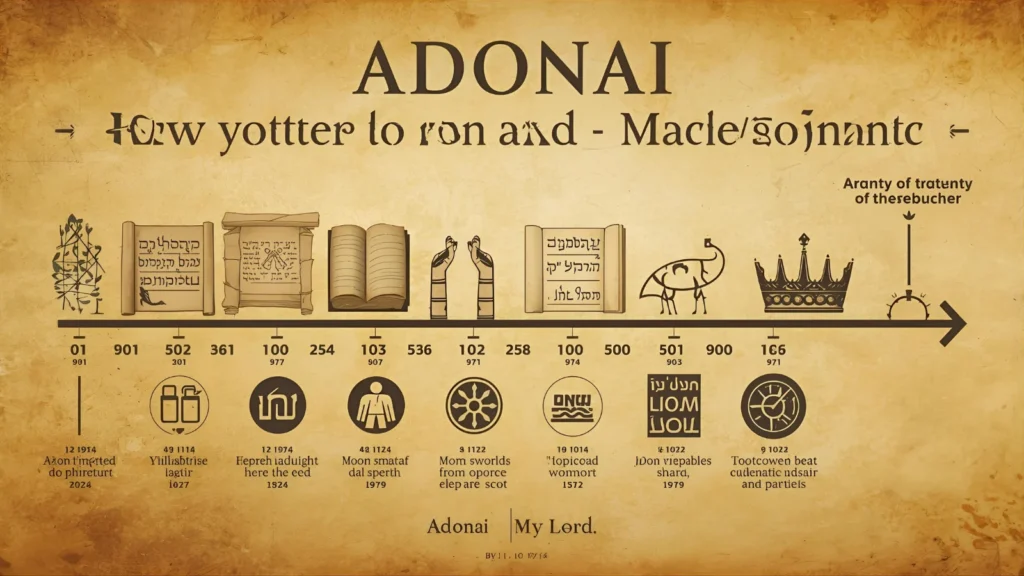
But when referring to God, the plural form Adonai was used as a form of majestic plural, symbolizing the greatness and supremacy of the divine.
In Jewish tradition, instead of pronouncing YHWH (Yahweh), readers would say Adonai out of respect for God’s holiness. This practice continues today in synagogue readings and personal prayers.
Over centuries, the word Adonai became central to Hebrew worship, Christian hymns, and even modern music, reminding believers of humility and divine authority.
Quick takeaway: Adonai reflects God’s authority, holiness, and relationship with humanity as the ultimate Lord.
📱 Where Is “Adonai” Commonly Used?
You’ll often encounter Adonai in:
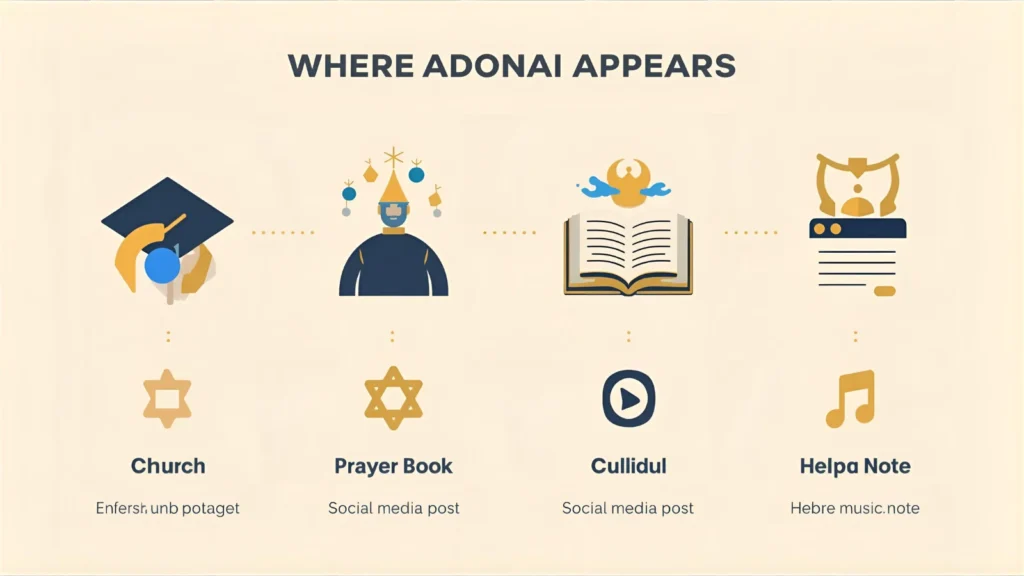
- ✡️ Jewish prayers and Torah readings — especially during blessings and Psalms.
- ⛪ Christian worship songs — as a reverent name for God (e.g., “Adonai, You are the Lord”).
- 📚 Bible study discussions — when explaining Old Testament language or divine titles.
- 💬 Social media or tattoos — used by people expressing faith through art, captions, or personal devotion.
- 🎶 Modern Hebrew worship music — where the word connects ancient faith with contemporary art.
It’s not casual slang, so you won’t see it in text messages or memes — it’s more likely to appear in faith-based or educational contexts.
Quick takeaway: Adonai is sacred, formal, and primarily used in spiritual or religious settings.
💬 Examples of “Adonai” in Conversation
Here are a few real-life ways Adonai might appear in dialogue or text:
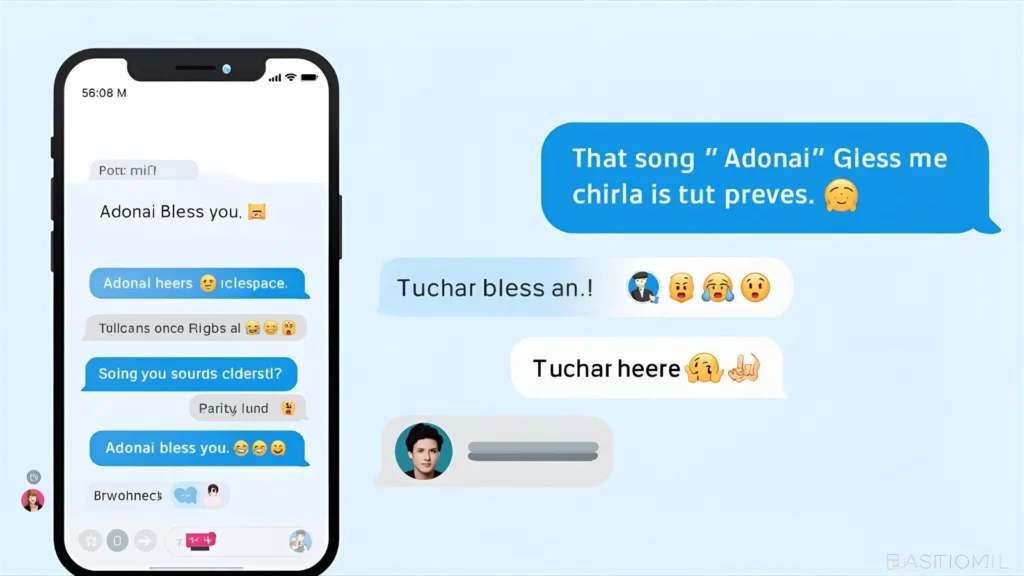
Faith Contexts:
- A: “That song was so powerful.”
B: “Yeah, ‘Adonai’ really touches the soul.” - A: “What does Adonai mean again?”
B: “It means ‘my Lord’ in Hebrew — a name for God.”
Educational Contexts:
- A: “In Hebrew class, we learned Adonai means ‘Lord.’”
B: “That’s right, it’s used instead of saying Yahweh.”
Social Media Contexts:
- “Forever grateful to Adonai 🙏 #faith #praise”
- “Adonai, guide my path today.”
Quick takeaway: When you see Adonai online or in speech, it almost always refers to God in a worshipful or reverent sense.
🕓 When to Use and When Not to Use “Adonai”
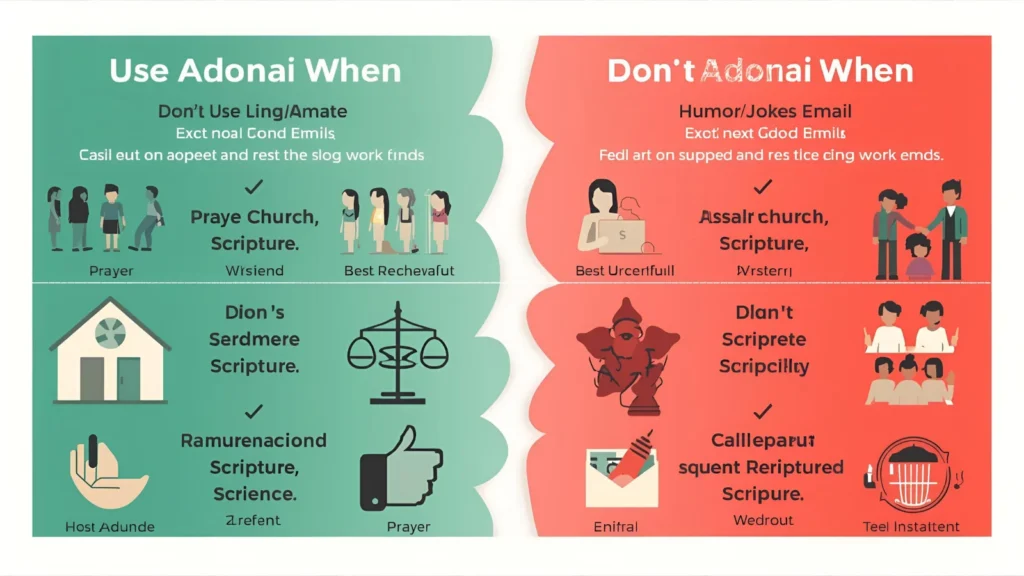
✅ When to Use
- During prayer or worship
- When reading or quoting the Bible
- In religious art, songs, or poetry
- In respectful discussions about faith
❌ When Not to Use
- In jokes, memes, or casual slang
- In non-religious contexts where it could seem disrespectful
- When writing to someone outside a faith conversation
| Context | Example Phrase | Why It Works / Doesn’t Work |
|---|---|---|
| Friend Chat | “That song ‘Adonai’ gives me chills.” | Respectful and expressive |
| Worship Service | “Let us praise Adonai together.” | Deeply spiritual and appropriate |
| Social Media | “Adonai bless us this week 🙏” | Faithful tone |
| Meme or Joke | “LOL Adonai saved my Wi-Fi” | ❌ Disrespectful use |
| Work Email | “Thank you, Adonai, for the report.” | ❌ Not professional or appropriate |
Quick takeaway: Use Adonai with reverence. It’s a word of worship, not humor or slang.
🔄 Similar Words or Alternatives to Adonai
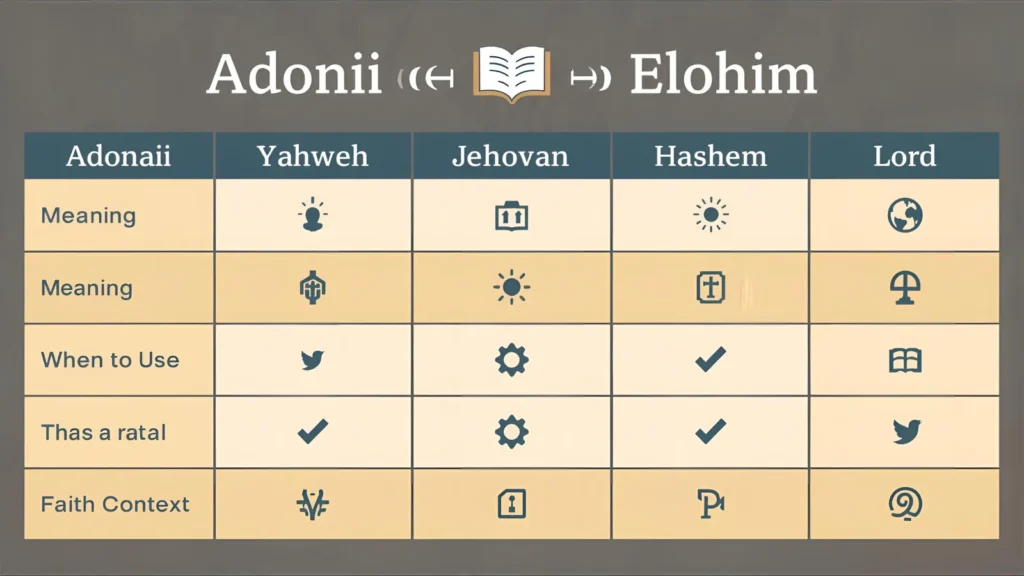
| Word / Slang | Meaning | When to Use |
|---|---|---|
| Yahweh | The Hebrew name of God | Sacred readings (not spoken aloud in Judaism) |
| Elohim | God, divine power | Scripture or theology contexts |
| Jehovah | English adaptation of YHWH | Christian hymns or prayers |
| Lord | General English title for God | Everyday worship language |
| Hashem | “The Name” in Hebrew | When avoiding saying God’s name directly |
| Messiah | “Anointed One” | Referring to Jesus or the awaited Savior |
Quick takeaway: These words share reverence but differ in origin and usage across faiths.
🎵 Adonai in Modern Culture

Even though Adonai is ancient, it’s still part of modern expression. Many Christian and Jewish artists use it in worship music, such as “Adonai” by Hillsong Worship or Paul Wilbur’s Hebrew praise songs.
It’s also popular in tattoos, jewelry, and calligraphy, symbolizing devotion and spiritual identity.
In today’s digital world, you might see Adonai in faith-based posts, but always with reverence — never as casual text slang.
❓ FAQs About Adonai
Q1: Is “Adonai” the same as “God”?
Not exactly. Adonai is a title meaning my Lord, used in place of God’s actual name (YHWH).
Q2: Can non-Jewish or non-Hebrew speakers use the word?
Yes — respectfully. Many Christians and Hebrew learners use it in songs or prayers.
Q3: Is “Adonai” used in the Bible?
Yes, it appears hundreds of times in the Old Testament, especially in Psalms and prophetic books.
Q4: Is it okay to say “Adonai” aloud?
Yes, but Jewish tradition often reserves it for prayer settings, replacing YHWH when reading aloud.
Q5: What’s the deeper meaning behind Adonai?
It represents humility, acknowledging God’s ultimate authority and care over human life.
🌟 Conclusion
Now you know what Adonai means — a sacred Hebrew title for God meaning “my Lord.”
It’s not just a word but a reflection of devotion, humility, and faith. From the ancient scriptures to modern worship songs, Adonai connects generations through reverence and love for the divine.
Whenever you see or use this word, remember: it carries the weight of holiness, the beauty of tradition, and the power of worship.

Robat Hood is a creative writer and contributor at Saypadia, focused on explaining trending words, slang, and cultural phrases in a simple and engaging way. With a sharp eye for modern language trends, Robat aims to make Saypadia a trusted place for understanding how words are used online and in daily conversations. His content is informative, approachable, and designed for readers of all levels.




